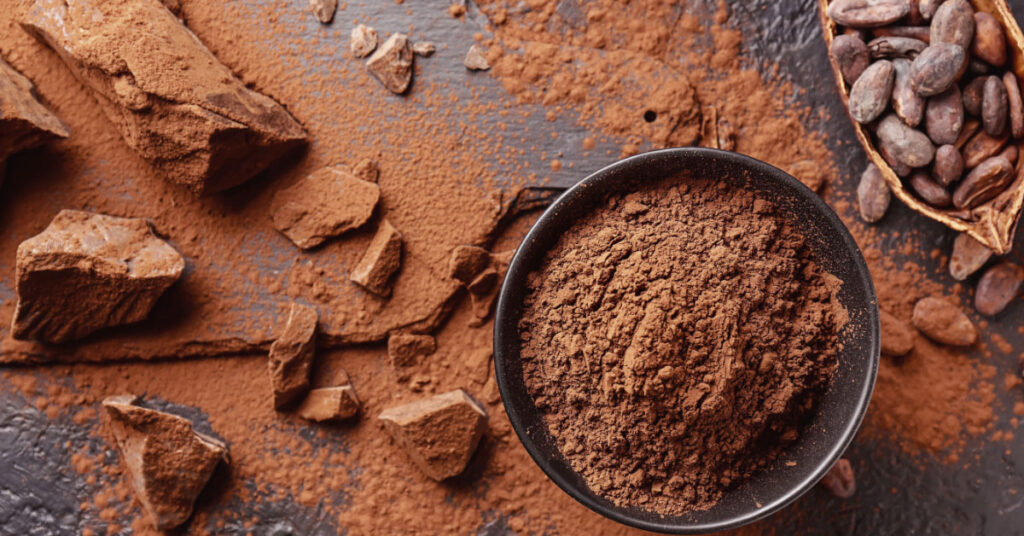Cocoa is obtained from the fruits of the woody plant Theobroma cacao, which originates from the tropic parts of America. From these fruits, you get cocoa mass (powder and cocoa fat) and from it chocolate, which is also the main use of cocoa. Cocoa powder is also used as a hot beverage.

Here’s more about cocoa powder and its benefits.
Table of Contents
A rich source of polyphenols that provide several health benefits
Polyphenols are natural antioxidants that are commonly found in fresh foods (fruits and vegetables), but also teas, chocolate and wine.
Their action is associated with several health benefits, such as reduced chronic inflammatory processes, improved circulation, lower blood pressure, lower cholesterol and blood sugar.
Cocoa is considered one of the richest sources of polyphenols in nature.
It is especially rich in flavonoids, which have powerful antioxidant and anti-inflammatory effects.
However, processing cocoa with too much heat and alkaline agents can lead to the loss of many of these beneficial components. This means that not all cocoa products will be particularly rich in them.
By increasing the level of one molecule, cocoa can help reduce high blood pressure
Cocoa, both in the form of chocolate and cocoa powder, can help lower blood pressure.
The flavonoids are considered responsible for this positive effect. According to studies, they can improve the level of nitric oxide, a gas that can help relax blood vessels and, consequently, reduce high blood pressure.
Cocoa can help reduce the risk of heart attack and stroke
In addition to lowering blood pressure, the reason for this effect of cocoa is its reducing effect concerning the “bad” LDL cholesterol in the blood.
Lowering blood pressure and improving the cholesterol profile inevitably lead to improved cardiovascular health, ie a significantly reduced risk of heart attack and stroke.
An analysis of nine scientific studies with more than 150,000 respondents found that those who consumed more dark chocolate had a significantly lower risk of heart attack and stroke over a lifetime. Another Swedish study gives us results according to which this positive effect of chocolate can be obtained only with moderate consumption (up to 30g per day), and larger quantities could create some problems.
Polyphenols also help for better brain function
Logically, improved blood circulation also affects the better supply of the brain with blood and all its nutrients.
Also, flavonoids can cross the brain barrier and participate in the biochemical processes that produce neurons, the most important molecules for brain function.
In one study, younger subjects included cocoa products with a high percentage of flavonoids in their diet. After just one week, the circulation in the brain improved by 8%, and in two weeks – by 10%. Scientific studies also indicate a positive effect of flavonoids in the elderly, but also in people who already have mental disorders.
Cocoa can have a positive effect on mood and symptoms of depression. This positive effect is thought to be in favor of the flavonoids, ie the transition of tryptophan to the natural mood stabilizer – serotonin. Thatis the feeling of satisfaction we feel after consuming chocolate.
One study found reduced stress in pregnant women who regularly consumed dark chocolate. Cocoa-containing drinks can contribute to calm and pleasure.
Cocoa flavonoids can reduce the symptoms of type 2 diabetes
Although it is known that excess chocolate is not recommended at all and is no good for diabetics, cocoa powder actually has some anti-diabetic effect.
Cocoa flavonoids can slow down the digestion of carbohydrates and their absorption in the digestive tract, then improve insulin secretion, reduce inflammation and stimulate the “intake” of sugar from the blood into muscle cells.
All of this has been confirmed by scientific studies, and several studies say that a diet rich in flavonoids prevents the development of type 2 diabetes.
Cocoa can help you lose weight in more surprising ways
It may sound paradoxical, but even dark chocolate cocoa can help you lose weight.
This property is due to the ability of cocoa to help regulate metabolic processes, ie reducing appetite and inflammatory processes, increasing fat oxidation and the feeling of satiety.
We will comment on two studies. One says that people who consumed dark chocolate more regularly had a lower BMI than people who consumed less often even though people in the first group ate more calories. Another study, which looked at individuals trying to lose weight, found that consuming dark chocolate further helped them lose weight because those who consumed it had better results than the control group.
Theobromine and theophylline from cocoa can help people with asthma
Asthma is a chronic inflammatory disease that causes closure and inflammation of the airways, which at times can even be life-threatening. Theobromine and theophylline may help with this condition. Theobromine is a similar component to caffeine and can help with chronic cough. Cocoa contains about 2g of this substance, per 100g. Theophylline, on the other hand, helps dilate the lungs and airways and reduce inflammation in them. However, clinical studies are needed for this effect of cocoa.
Cocoa has antibacterial properties and benefits for the skin
Cocoa contains several components with antibacterial and immunostimulatory action, which, above all, can contribute to the health of the oral cavity. It has been shown in some studies to be successful in dealing with common oral bacteria that cause tooth decay.
Chocolate is considered to be one of the causes of acne, but studies show the opposite – cocoa polyphenols actually have some positive effects on the skin.
More and more research shows that regular consumption of cocoa can contribute to protection from the UV rays of the sun, improve the circulation of blood vessels in the skin, but also improve its texture and hydration.
